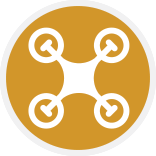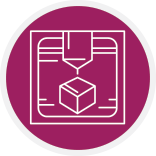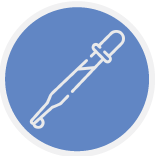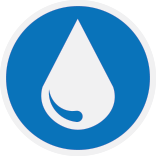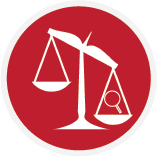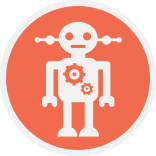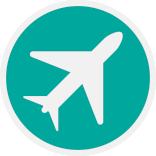Uncrewed Aerial Vehicles (UAVs) form one of the most vibrant sectors in the aerospace industry. From natural resource and agricultural crop monitoring to infrastructure inspection and search and rescue operations, aerial robotics can provide real-time monitoring and access to remote and dangerous locations.
The development of commercial UAVs requires a broad array of technical skills, across multiple disciplines that bring together aerodynamicists, structural designers, materials engineers, propulsion experts, control specialists and roboticists to design and develop state-of-the-art aerial robotic platforms.
With over 20 courses, the Emphasis in Aerial Robotics, sponsored by the Centre for Aerial Robotics Research and Education (CARRE), focuses on integrated research and development on aerial robotics systems, from design, instrumentation and autonomy.
Students who complete the requirements of the emphasis will have it notated on their transcript.
Program Eligiblity
Graduate students registered in the following MEng programs can specialize in the Aerial Robotics emphasis:
University of Toronto Institute for Aerospace Studies (UTIAS)
You cannot apply to the emphasis directly as a standalone program. If you are a prospective student, you can learn more about applying to our MEng programs here.
Careers
Graduates who complete the Aerial Robotics emphasis are employed by companies in areas including:
- aerospace,
- building automation,
- manufacturing,
- transportation
and more.
Some of the roles our graduates secure are:
- Machine learning developer
- Robotics engineer
- Software specialist
- Systems engineer
Emphasis Requirements
The Emphasis in Aerial Robotics Program is not tracked through ACORN. Register your interest by completing this form.
For more information review the Overview of Program Requirements.
MEng* students must complete:
- AER1216H (Fundamentals of UAVs) and AER1217H (Development of Autonomous UAS)
- One other course from the approved list or other related course approved by the CARRE Director
- One MEng project course relevant to UAVs
- * UTIAS MEng students must complete AER1810H (MEng Project), supervised by a UTIAS professor.
- * Non-UTIAS MEng students must complete their home department MEng Project course, under supervision of a professor.
MASc and PhD students must complete:
- AER 1216H (Fundamentals of UAVs) and AER 1217H (Development of Autonomous UAS)
- One other course from the approved list or one other related course approved by the CARRE Director
- One MASc/PhD thesis relevant to UAVs
Some courses may satisfy the requirements of multiple emphases. Students may double-count a maximum of one course towards the requirements of any two emphases.
Students cannot earn more than two emphases.

The experience I’ve gained in aerial robotics translates seamlessly to autonomous driving applications, as both aerial and ground vehicles share many underlying principles. The comprehensive knowledge in navigation, path planning, and control, combined with the practical coding skills acquired through the Aerial Robotics emphasis, has significantly enhanced my qualifications as a software engineer in the automotive industry.
Xiyu Liu, MEng graduate
Courses
UTIAS
- AER501H1: Computational Structural Mechanics and Design Optimization
- AER503H1: Aeroelasticity
- AER506H1: Spacecraft Dynamics and Control 1
- AER510H1: Aerospace Propulsion
- ROB521H1: Mobile Robotics and Perception
- AER525H1: Robotics
- AER1202H: Advanced Flight Dynamics
- AER1211H: Human Control of Flight Systems
- AER1303H: Advanced Fluid Mechanics
- AER1308H: Introduction to Modern Flow Control
- AER1310H: Turbulence Modelling
- AER1316H: Fundamentals of Computational Fluid Dynamics
- AER1403H: Advanced Aerospace Structures
- AER1410H: Topology Optimization
- AER1415H: Computational Optimization
- AER1503H: Spacecraft Dynamics and Control II
- AER1513H: State Estimation for Aerospace Vehicles
- AER1514H: Mobile Robotics
CSC
- CSC411H1: Machine Learning and Data Mining
- CSC2503H1: Foundations of Computational Vision
ECE
- ECE537H1: Random Processes
- ECE1505H1: Convex Optimization
- ECE1512H1: Digital Image Processing & Applications
- ECE1762H1: Algorithms & Data Structures
MIE
- MIE506H1: MEMS Design and Microfabrication
- MIE1740H1: Smart Materials and Structures
- MIE1809H1: Advanced Mechatronics
Questions?
If you have questions about the Aerial Robotics emphasis, contact the Centre for Aerial Robotics Research and Education (CARRE):
Email: coordinator@carre.utoronto.ca
Tel: 416-667-7796
For more information, visit the MEng emphases FAQ page »

